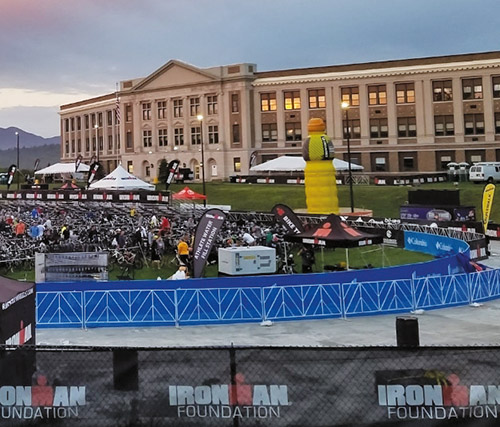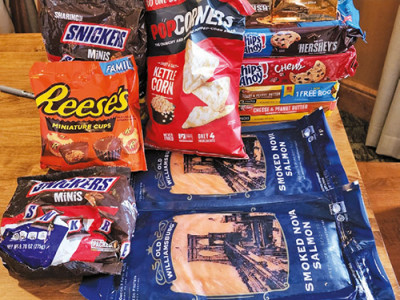
Friday, 10:00 p.m.
(32 hours to race start.)
Shabbos of an Ironman triathlon means turning hotel suite furniture into a Shabbos table for 6-12 people.
It means unscrewing the hotel suite refrigerator light bulb.

It means a washing cup adorned with stickers from the Ironman triathlons we have competed in.
It means reading in the hotel room on Friday night while my kids sleep on the other sofa
by whatever light we are leaving on for all of Shabbos.
(As opposed to the timer ones in our home.)
It means that there’s no Shabbos alarm. There’s no minyan to get up for.
It means food, lots and lots of food.
It usually means the best night of sleep I will have all year.
Eight months of prep is now behind me and the race is going to happen in a day and a half.
There is nothing left to do but walk down to the start on race morning. Everything else has been taken care of.
(Didn’t you once sleep a “bagel”?)
I did. One year, I slept for 12 straight hours.
(Don’t you normally wake up in the middle of the night and go running during the year?)
During the year I have to worry about my elderly parents, my wife and my kids. I have work responsibilities, coaching responsibilities, yearly doctor checkups and dental cleanings. There’s always another holiday on the horizon and there’s always the worry that I will forget something.
(Why do we as Jews fear the coming of our holidays?)
But two nights before an Ironman triathlon there’s food and there are books and there’s the best night of sleep.
Saturday, 8:00 p.m.
(22 hours to race start.)
The suite’s balcony afforded me a view of the mountains as I stood there wrapped in my tallis.
I will be biking through the mountains on Sunday, but for now, I looked for God as I prayed.
God is there, God is … well everywhere. I found it three weeks earlier at Ironman in the UK; God is even on my bike as I pedal.
My wife Janet was up by the time I finished davening. I made kiddush on grape juice for the two of us. Anyone who has traveled knows that there is something intimate about making kiddush for your wife in a hotel room, especially within eyesight of the tea lights she used for Shabbos licht. It’s an affirmation of our marriage that no matter where we travel, we are a unit.
(Even as your kids lay five feet from you snoring?)
Even with the snoring.
(Did you have a “schtickle” herring for kiddush?)
I ate a value pack of lox.
(I’m sorry, did you say, “a bagel and lox”?)
No, I ate a 16-ounce value pack of lox.
(What did your wife eat?)
Ok, she had a “schtickle” of lox; I ate the rest of the value pack.
(Isn’t the goal of carbo-loading … to eat carbs?)
You can only store so much glycogen in your body. I wanted to make sure that I had enough sodium and hydration.
(Seven and a half servings of lox will do that.)
For the sodium. For hydration, I started what would be a day of sipping on electrolyte solution.
Saturday, 10:00 p.m.
(20 hours to race start.)
Ruth arrived at our hotel room with a surprise.
Ruth was wearing a T-shirt that read “Goy Shabbos.”
(Isn’t it supposed to say “Shabbos Goy”?)
Ruth pointed out the printing error before I could say anything.
Ruth had done the homework. Ruth knew that bike check-in was on Shabbos and I was going to need someone to walk my bike from the room to t1, the staging area for bikes.
(Hence the T-shirt.)
Ruth walked “Friday” down the hall.
(“Friday”?)
Friday is the name of my bike.
(Why did you name your bike “Friday” … and why did you name your bike?)
I named my first carbon framed triathlon bike “Jarvis.”
(From the “Iron Man” movies.)
So naturally, I named the replacement…
(“Friday.”)
Ships have female names, so that is where I think the practice of anthropomorphizing bicycles comes from … but I could be wrong.
(You?)
Was that sarcasm?
(From me?)
I will take that as a “yes.”
Ruth walked both our bikes down to the Olympic Oval.
(The “Olympic what?”)
The Olympic Oval was built for the speed skating competition for the 1980 Winter Olympics in Lake Placid. Everyone remembers the “Miracle on Ice” when the U.S. hockey team beat the Russians for the gold medal.
(No!)
No?
No, the U.S. beat the Russians to make it to the final round to beat the Finns. The Russians were seen as unbeatable, especially for an amateur team of young Americans.
That was held indoors, in the Olympic Center next door. The Olympic Oval is where Eric Heiden won five gold medals in speed skating. I was 12 years old and watched Heiden with my dad. We also watched bobsled and sledding on ice called “luge.” Back then we didn’t often find something we both wanted to watch besides the occasional World War II film or James Bond movie. Dad in his recliner that no one else was permitted to sit in and me on the sofa that no one was supposed to eat on for fear of death.
(You ate while sitting on it?)
Mom made both of us spaghetti in marinara sauce. To this day, it’s hard for me to make that simple dish and not think back to that winter. That was the winter we found “common ground” in television viewing of the Winter Olympics.
Forty two and a half years later, triathlon bikes stood on the fresh grass that filled the center of the concrete oval where snow and ice once covered everything. Memories of the 1980 Olympics linger everywhere in Lake Placid … and in my mind when I close my eyes.
David Roher is a USAT certified triathlon and marathon coach. He is a multi-Ironman finisher and veteran special education teacher. He is on Instagram @David Roher140.6. He can be reached at [email protected].










